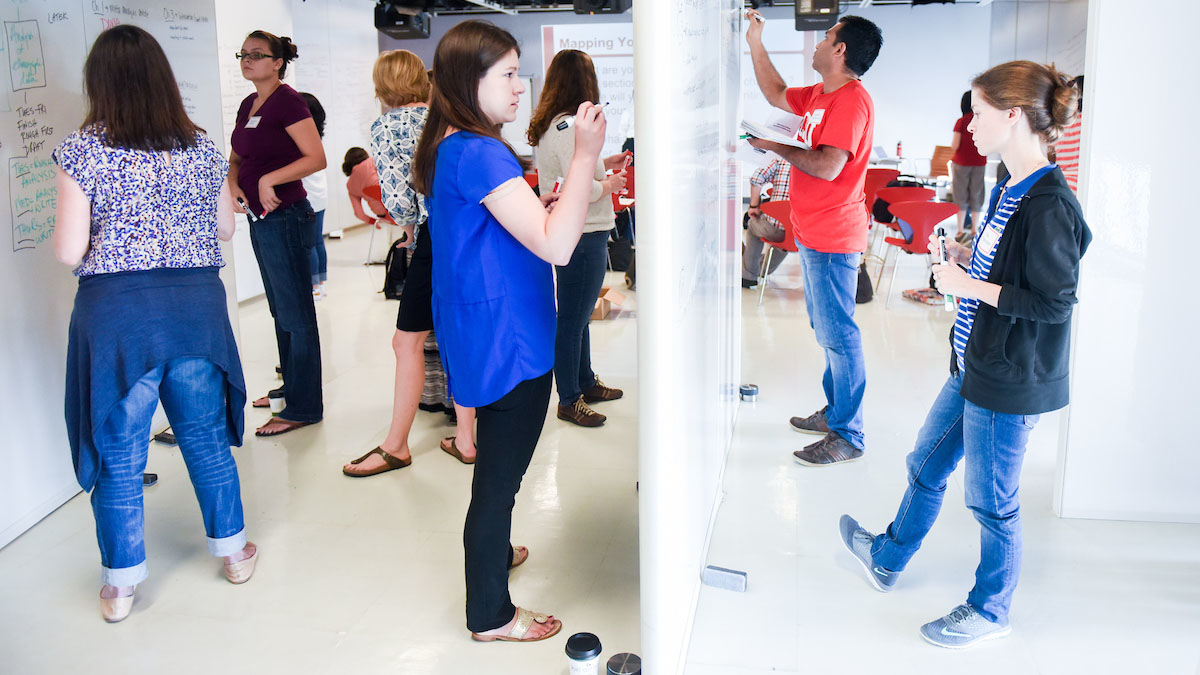Get to Know: The Graduate School

The Graduate School at NC State provides oversight and administration of all policies and procedures throughout the graduate student lifecycle. From recruitment and retention to mentorship, dissertation support and graduation, the Graduate School engages in continual efforts to promote student success and provide support for graduate faculty and staff along the way.
We spoke with Dr. Maureen Grasso, dean of the Graduate School, about how the school supports NC State’s comprehensive excellence; supports faculty, students and staff through unique programming; and constantly works to streamline the graduate education process.

What is the role of the Graduate School at NC State?
The new knowledge that’s being created at universities is coming out of graduate education — the research that’s being done, the work that graduate students are doing alongside faculty as well as on their own. For the Graduate School at NC State, we’re all about generating new knowledge and creating stewards of the discipline moving forward.
The Graduate School is an academic unit of the university. We cover everything from admissions through clearing students for graduation, handling the challenges and successes along the way. We work collaboratively with deans and other faculty across campus to achieve the goal of serving students. One of our key roles is creating and supporting an environment in which integrity and excellence are the cornerstones of graduate education. We’re constantly scanning the environment to get ahead of changes in higher education. For example, when there was a possibility of changes coming to the Affordable Care Act and Fair Labor Standards Act that would impact graduate students, we worked with human resources and peer institutions to prepare ourselves in advance. We were ready a year ahead of time, and the university relied on the resources we provided to help potentially impacted stakeholders.
I really see my role as a steward of the graduate student experience and an advocate for student success. In the Graduate School, we provide quality assurance through the development of policies, procedures and other facets of graduate education that will better serve our students. One focal point has been the Graduate Handbook, which we are revising to communicate to graduate students in a more concise manner. Additionally, we’re streamlining program review, and we feel we have in place one of the best processes in the country.
Everything we do revolves around high-quality education. We work with the faculty as they are developing new degree programs to provide constructive feedback. We appoint every single postdoctoral scholar and do all the HR work for those individuals; and we appoint every graduate student who is a teaching assistant or research assistant in terms of getting them into our system. This helps us save time and effort so faculty in other units don’t have to tend to these details. There’s a lot of behind-the-scenes work that we do as an academic unit overseeing the quality of graduate programming. We want to serve as a catalyst for excellence and innovation in graduate education.
If you think about the size of the university, we’re a microcosm of that system. We have about 9,000 international and domestic graduate students. The Graduate School is a very exciting part of NC State — it is where new knowledge is created and where students always ask the kinds of questions that really challenge us.
How does the Graduate School work with and support faculty and staff at the university?
We work with our Administrative Board to develop graduate curricula, providing lots of support behind the scenes for faculty working to start new programs. We work closely with graduate program directors, and the Graduate School support staff provides them with one-on-one training, workshops throughout the year, assistance with changes to the Graduate Handbook, and training on new workflow systems.
Training on mentoring is another important service that we provide to university faculty. In the past, we brought Dr. Lucy Johnson from the University of Canterbury in New Zealand to talk about mentoring. In addition, Theater Delta, an improv group, has performed for both students and faculty to depict a day in the life of a student and professor interacting during the year, to show how mentoring is or isn’t happening and how there’s unconscious bias present in many interactions. We also did a workshop this past fall on best practices for recruiting students. Each year, we honor faculty mentors who go the extra mile with the Outstanding Graduate Faculty Mentor Awards, to show how integral faculty mentors are to graduation.
Additionally, we are working with the Office for Institutional Equity and Diversity on the Doctoral Mentoring Fellowships. We’re working with faculty across campus to ensure that the graduate environment is an inclusive one. We’re examining experiences and issues of underrepresented populations and engaging faculty to come up with programs that would be relevant — either a discussion or activity that can improve the environment in their particular department.
We also support faculty through organizing the training of teaching assistants. Last year, we had more than 100 students attend our initial TA training, so we are now looking to partner with colleges to offer more specific training in their areas. We’re also looking for new faculty to participate in a program we’re developing — to help faculty who are mentors on how to recruit graduate students and support them through graduation.
How do the Graduate School’s services and initiatives work toward NC State’s overall organizational excellence?
We’re constantly assessing what we do in order to be more efficient and effective in our mission. We ask questions about “Why do we do this process, and why do we do it that way?” In getting people to stop and think about the why, we can know what elements we want to keep and what we want to change. One outcome of this is the Graduate School’s creation of a system called NextGen Appointments, which has changed the way we appoint all graduate TAs, RAs and postdocs. Our success with NextGen has led HR to utilize some of the technology at the enterprise level..
Professional development is another area of graduate education where we’re constantly evaluating what we’re doing and how we can do it better. We’ve reconfigured our conceptual framework to increase support through the development of communications skills, mentorship opportunities and networking coaching. Approximately 70 percent of our students go into industry or some place other than the academy. We’re trying to help them think about how the knowledge and skills they develop at NC State are transferable out into the world. We’re also broadening our services to reach more students. For example, we’re now offering our Dissertation Institute to master’s students as well as Ph.D. students. Additionally, we offer writing groups that meet a few times a month to encourage students to write more and in a more timely manner.
We’re also doing more to help struggling students through faculty mentoring. We started asking faculty to provide a mentoring plan to help these students, to enhance their chances of success. We want all of our students to graduate, and that’s an example of working together with faculty to achieve organizational excellence.
The Three Minute Thesis (3MT®) is another great example of how the Graduate School supports NC State’s overall organizational excellence. This is an international research communication competition that challenges graduate students to give a compelling presentation on their research topics in a limited amount of time. We’ve been doing this at NC State for two years, and during our first year, the university’s winner went on to place second in the regional competition. We work with these students to do everything we can to support them and help them prepare for competition because the research they conduct here really is amazing.
In what ways does the Graduate School work to strengthen NC State’s academic reputation?
The best and brightest students attract the best and brightest faculty, and vice versa. We play a key role in recruiting and retaining both students and faculty by doing our job efficiently. For students, we administer the Graduate Student Support Plan, the Provost’s Fellowship, programs for underrepresented groups, and more. We are not a career center, but we do everything in our power to make sure that students are ready to enter the real world and excel in a career.
For students and faculty, we ensure the quality of each degree program, including new degree programs and certificate programs, to offer the best teaching, research and learning environment possible. At the request of the faculty, we’ve also joined in a partnership with the Center for the Integration of Research, Teaching and Learning, which involves 40 universities and helps prepare graduate students who want to go into the professoriate. Through this partnership, faculty help give graduate students more hands-on STEM teaching experience.
For students, we’re working on a new system called GradPath, which is a graduate student success application. Students can download this app their phones and it walks them through all the necessary processes and procedures of graduate school from the time they apply all the way through graduation. At the Council of Graduate Schools Annual Meeting, we were given an honorable mention for our work in this area. Once students get here, we offer a number of programs to encourage them to succeed academically and prepare for graduation. For doctoral students, we conduct workshops with faculty who have been on NSF panels to help consult on National Science Foundation Fellowship applications. Once a student is awarded one of these fellowships, we keep a copy of their proposal in the Graduate School office to serve as a resource for other students looking for guidance on their impact statements. We’ve increased support for NSF applicants because that represents $30,000 being contributed by the NSF that departments don’t have to worry about funding. Additionally, we fund Dissertation Completion Grants to remove financial barriers to graduation. We also counsel at-risk students one-on-one on their writing and other work, and we have a very high success rate in graduating those students.
What is something that people in the campus community may not know about the Graduate School?
I think that people are unaware just how much time and how many people are needed to keep graduate education moving at NC State. We’re completely committed to working with faculty, students and staff to provide excellent graduate education and policy consistency across all degree programs. From the Graduate School’s administrative body to the Graduate Operations Council, we have an incredible team that is able to communicate well and do so much in terms of the service and quality we provide. We have 60,000 living alumni who can attest to this.
We truly have a passion for what we do each day to make the lives of faculty easier, so they can focus on doing what they do best. We bring quality and excellence into everything we do. And we’re constantly looking for new ideas for improvement to make NC State a national leader in graduate education.
Learn more about how The Graduate School equips students to excel in and shape the real world through more than 200 nationally-renowned programs.
This post was originally published in Provost's Office News.
- Categories:


